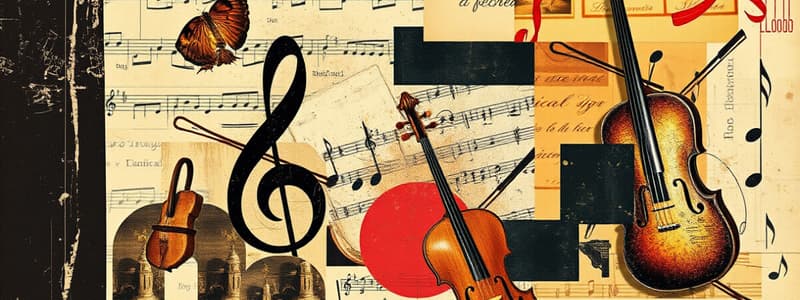Podcast
Questions and Answers
What are the dates of the Classical Period?
What are the dates of the Classical Period?
1750-1820
What was the dominant city for classical music?
What was the dominant city for classical music?
Vienna, Austria
What are characteristics of the Late Baroque Period?
What are characteristics of the Late Baroque Period?
Complex polyphony, harpsichord, repetitive rhythms, single mood throughout a piece
What are characteristics of the Classical Period?
What are characteristics of the Classical Period?
What was the dominant musical texture of the Classical Period?
What was the dominant musical texture of the Classical Period?
What are examples of string instruments?
What are examples of string instruments?
What are examples of woodwind instruments?
What are examples of woodwind instruments?
What are examples of brass instruments?
What are examples of brass instruments?
What are examples of percussion instruments?
What are examples of percussion instruments?
What is a symphony?
What is a symphony?
What is chamber music?
What is chamber music?
What is a string quartet?
What is a string quartet?
What is a concerto?
What is a concerto?
How did the ideals of the Enlightenment Era impact Classical Music?
How did the ideals of the Enlightenment Era impact Classical Music?
How did Haydn's music reflect the Enlightenment Era?
How did Haydn's music reflect the Enlightenment Era?
Flashcards are hidden until you start studying
Study Notes
Classical Period Overview
- Dates of the Classical Period range from 1750 to 1820.
- Vienna, Austria emerged as the dominant city for classical music during this time.
Musical Characteristics
- Late Baroque Period featured complex polyphony, harpsichord use, repetitive rhythms, and maintained a single mood throughout pieces.
- Classical Period shifted to a homophonic texture, emphasizing melody over harmony, and introduced the forte piano with changing rhythms and a variety of moods.
Instrumentation
- Strings: Consisted of violins, viola, cello, and bass.
- Woodwinds: Included flute, bassoon, oboe, and clarinet.
- Brass: Featured trumpet, French horn, and trombone.
- Percussion: Comprised timpani, percussion instruments, and harp.
Musical Forms
- Symphony: An orchestral piece structured in four movements.
- Chamber Music: Written for small ensembles (2-10 performers), typically featuring one player per part.
- String Quartet: The leading chamber music genre, consisting of two violins, a viola, and a cello.
- Concerto: Composed symphonies that highlight the contrast between a soloist and the orchestra.
Influence of Enlightenment Era
- Enlightenment ideals fostered music equality, making musical instruments equally important in compositions.
- Music became more accessible to the middle class, promoting broader participation and enjoyment.
Haydn's Contribution
- Haydn's music reflected Enlightenment principles through accessibility and engaging presentation.
- Key examples:
- Surprise Symphony: Noted for dramatic loud outbursts.
- Farewell Symphony: Notable for musicians exiting the stage one by one, enhancing drama and suspense.
Studying That Suits You
Use AI to generate personalized quizzes and flashcards to suit your learning preferences.



